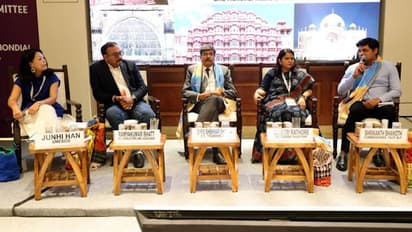Sustainable & Community-Centric Approach Crucial for Urban Heritage Preservation & Development: PS Sheo Shekha

Synopsis
Bhopal. Madhya Pradesh Tourism Board took centre stage at the 46th session of the UNESCO World Heritage Committee, showcasing its commitment to preserving India’s rich urban heritage.
- Madhya Pradesh Highlights Heritage Conservation at a special session at 46th UNESCO World Heritage Committee Meeting in New Delhi
- Madhya Pradesh's Gwalior and Orchha Shine at UNESCO Heritage Committee.
Bhopal. Madhya Pradesh Tourism Board took centre stage at the 46th session of the UNESCO World Heritage Committee, showcasing its commitment to preserving India’s rich urban heritage. A special session on “Managing Historic Cities and Settlements: Urban Heritage in India and the HUL Recommendation” brought together experts, policymakers, and stakeholders to discuss challenges and opportunities in this domain.
The session featured a presentation on Madhya Pradesh’s heritage cities, Gwalior and Orchha, along with Jaipur and Ahmedabad. The state's efforts in integrating heritage conservation with urban development were highlighted, drawing appreciation from attendees. Mr. Sheo Shekhar Shukla, Principal Secretary Tourism & Culture and Managing Director Madhya Pradesh Tourism Board, Mr. Neeraj Mandloi, Principal Secretary UADD, Madhya Pradesh Ms. Gayatri Rathore, Principal Secretary Tourism, Rajasthan, and Mr. Ramya Kumar Bhatt, Deputy Commissioner, Ahmedabad, Municipal Corporation were esteemed panelists of the session moderated by Ms. Junhi Han, Chief of Culture India UNESCO where they all share insights on “Managing Historic Cities and Settlements”.
Principal Secretary Shri Sheo Shekhar Shukla emphasized on the importance of community involvement in heritage conservation. He stressed the need for a balanced approach that combines preservation with economic development, creating opportunities for local communities.
Principal Secretary Mr. Shukla said the heritage cities can be developed and conserved at the same time by putting the community at the core. We must sensitize the community, instil a sense of ownership and generate livelihood opportunities around the built and intangible heritage. Ensure that the historicity of a city can be leveraged for the wider welfare and benefit of the people at large. Besides by creating the right kind of framework for private investment a balance can be attained at the heritage cities.
Shri Shukla said we have been able to attain a balance between conservation along with development of serene and natural destinations in Madhya Pradesh like our National Parks. Here, we have created a framework where we know that the boundaries of the national park are sacrosanct. And tourism up to a limit is certainly fine. But beyond a limit, it is a big no-no. Conservation and preservation of urban city can be done by a holistic approach. Our heritage cities will become dynamic, vibrant, and robust examples of not only conservation, preservation, restoration through a balanced approach but also promotion of tourism in a big way.
The session underscored the significance of the HUL Recommendations in guiding heritage conservation efforts and promoting sustainable urban development in India